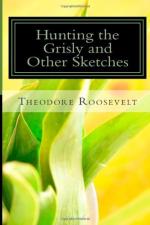Fox-hunting is a great sport, but it is as foolish to make a fetish of it as it is to decry it. The fox is hunted merely because there is no larger game to follow. As long as wolves, deer, or antelope remain in the land, and in a country where hounds and horsemen can work, no one could think of following the fox. It is pursued because the bigger beasts of the chase have been killed out. In England it has reached its present prominence only within two centuries; nobody followed the fox while the stag and the boar were common. At the present day, on Exmoor, where the wild stag is still found, its chase ranks ahead of that of the fox. It is not really the hunting proper which is the point of fox-hunting. It is the horsemanship, the galloping and jumping, and the being out in the open air. Very naturally, however, men who have passed their lives as fox-hunters grow to regard the chase and the object of it alike with superstitious veneration. They attribute almost mythical characters to the animal. I know some of my good Virginian friends, for instance, who seriously believe that the Virginia red fox is a beast quite unparalleled for speed and endurance no less than for cunning. This is of course a mistake. Compared with a wolf, an antelope, or even a deer, the fox’s speed and endurance do not stand very high. A good pack of hounds starting him close would speedily run into him in the open. The reason that the hunts last so long in some cases is because of the nature of the ground which favors the fox at the expense of the dogs, because of his having the advantage in the start, and because of his cunning in turning to account everything which will tell in his favor and against his pursuers. In the same way I know plenty of English friends who speak with bated breath of fox-hunting but look down upon riding to drag-hounds. Of course there is a difference in the two sports, and the fun of actually hunting the wild beast in the one case more than compensates for the fact that in the other the riding is apt to be harder and the jumping higher; but both sports are really artificial, and in their essentials alike. To any man who has hunted big game in a wild country the stress laid on the differences between them seems a little absurd, in fact cockney. It is of course nothing against either that it is artificial; so are all sports in long-civilized countries, from lacrosse to ice yachting.
It is amusing to see how natural it is for each man to glorify the sport to which he has been accustomed at the expense of any other. The old-school French sportsman, for instance, who followed the bear, stag, and hare with his hounds, always looked down upon the chase of the fox; whereas the average Englishman not only asserts but seriously believes that no other kind of chase can compare with it, although in actual fact the very points in which the Englishman is superior to the continental sportsman—that is, in hard and straight-riding and jumping—are those which drag-hunting tends to develop rather more than fox-hunting proper. In the mere hunting itself the continental sportsman is often unsurpassed.




